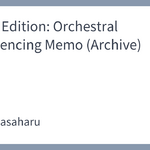(Original posted on April 9, 2002)
“I am the type of person who cannot help but think not only about creating music, but also about ‘what on earth is music?’ and ‘for what purpose do I compose?’, and I have spoken and written about such things.” – This is a masterpiece of music criticism by an author who describes himself in this way.
Here is an impressive passage from the book. “(In response to the problems brought about by the pursuit of individuality/originality—) What is first and foremost important for art is universal beauty and truth. The fact that we can only reach it through individuality is merely a fated necessity that arises because we humans have physical bodies and are separated into individual beings. And yet, to mistake individuality as the ultimate value—that, I believe, is the cause that obstructs a ‘solution’.”
This book was published in 1971, and it contains passages that show the author’s skeptical attitude toward the avant-garde music of the time, making it a valuable testament to its era. While the author himself acknowledges the genius of Schoenberg and his contemporaries, he states that he cannot sympathize at all with the “speculative tendencies” or “inclination toward intellectual games” seen in the works of composers who revered Webern like a cult leader. Furthermore, through his account of a panel discussion at the Karuizawa Contemporary Music Festival, his thoughts on music as an art form are depicted.
The following sentence gives a glimpse into the author’s values: “Artists tend to want to think of art as something pure, separate from social phenomena, and they tend to maintain a lofty solitude and dislike compromise. However, I believe that fundamentally, art cannot be considered apart from society.” He then goes on to perceive art by likening it to communion, stating that if it can have religious meaning, then the act of creation is not merely crafting objects, but that human artistic creation could even be considered as shouldering a part of God’s creation of the world.
◇
Pardon my bluntness, but I believe Sadao Bekku is a truly sincere and honest person when it comes to music. This is something I felt when I listened to Mr. Bekku’s music; there was a certain purity to it, as if the author was expressing the musical world he was hearing without any falsehood.
The tone of this book is similarly simple throughout, avoiding the bad habit of being unnecessarily abstruse, or of using words for the sake of words and concepts for the sake of concepts. Readers with composing experience might get the impression that they are engaged in a pleasant conversation over tea on a lazy afternoon.
I myself often had silent conversations with the book, thinking, “So, Mr. Bekku, you think so too? That’s what I thought as well.” It gives a glimpse into one of the reasons this book has been reprinted for so long. However, it’s a pity that, perhaps due to recent circumstances in the publishing industry, an increasing number of bookstores no longer carry it.
More information about the book
Title (Japanese) :『音楽の不思議』
Author : 別宮 貞雄 (著)
ISBN : 4276200806
Table of Contents for “The Wonder of Music”
- Part I: The Wonder of Music
- Chapter 1: Absolute Pitch and Relative Pitch (Part 1)
- Chapter 2: Absolute Pitch and Relative Pitch (Part 2)
- Chapter 3: Absolute Pitch and Relative Pitch (Part 3)
- Chapter 4: Scales (Part 1) —Modality—
- Chapter 5: Scales (Part 2) —Pythagorean Scale / Pitch Names and Solmization—
- Chapter 6: Scales (Part 3) —Twelve-Tone Equal Temperament— Is It a Product of Rationalism?
- Chapter 7: The Establishment of Tonality and Its Future
- Chapter 8: Timbre
- Chapter 9: The Timbre of the Piano
- Chapter 10: Rhythm
- Chapter 11: Spatial Representation —The Concept of Tempo—
- Chapter 12: Structure (Part 1) —Its Formal Beauty—
- Chapter 13: Structure (Part 2) —Its Statics and Dynamics—
- Chapter 14: Does Music Express Something?
- Chapter 15: Information Theory —Composition by Electronic Computer—
- Chapter 16: Music and Sports
- Chapter 17: Incidental Music and Dramatic Music
- Chapter 18: What Moves the Human Heart?
- Chapter 19: Individuality, Originality, National Character
- Chapter 20: Composer, Performer, Audience
- Chapter 21: Myself
- Part II: In Search of Music
- From a Natural Science Aspirant / My Teacher Darius Milhaud / What I Learned in Europe / Notes on My Musical Aesthetics / Karuizawa Contemporary Music Festival—A Record of a Dojo-Challenger— / Questions about Electronic Music / The Prodigal Son Will Return—My View on Contemporary Music— / A Study of the Human in Olivier Messiaen / Art and Science—In the Case of Music— / The Ethics of Criticism / Imitation and Imagination in Art—The Utility and Limits of Imitation— / Religious Music for Contemporary Japanese People / On the Fate of Various Compositional Styles in Modern Japan
About the Author
Bekku Sadao
Born in Tokyo in 1922. Graduated from the University of Tokyo, Faculty of Science, Department of Physics in 1946. Graduated from the same university, Faculty of Letters, Department of Aesthetics in 1950. Studied in Paris from 1951 to 1954 under Darius Milhaud. He has won the Mainichi Music Competition First Prize, the Mainichi Music Award, the Otaka Prize, and the National Arts Festival Award, among others. He is currently a professor at Chuo University and a lecturer at the Toho Gakuen School of Music. (Quoted from this book)
Related Articles




